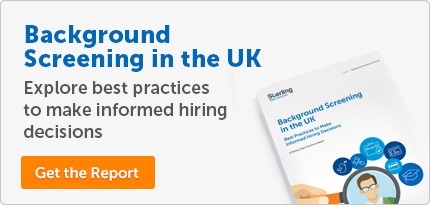October 25th, 2017 | Sterling
What is a Criminal Record Check?

New employees are one of the biggest investments a business can make. With each new hire, companies invest time, training, money and resources in the hope that their new employee will add to the success of the company. An employment background check provides a detailed look at a new hire, giving employers the insight they need to make an informed hiring decision. Depending on the industry, there may be additional compliance and legal considerations when screening a potential new employee that must be considered, such as verifying certifications, credentials, credit or DVLA records.
Why Should You Conduct Background Checks?
Background screening is important because it protects an organisation’s property, assets, reputation, brand and ultimately its biggest asset, the people. The Sterling’s 2016 Background Screening Trends and Best Practices Report found that 40% of our survey respondents still do not conduct background screening. For those that do screen, the number one reason for conducting background screening checks is improving or meeting regulatory compliance (67%) followed by improving the quality of hires (59%), company reputation (53%) and enhanced workplace safety and security (50%).
Each organisation is unique and requires unique solutions for the hiring process to allow companies to hire with confidence. There are many types of background screening checks from criminal record checks to education and employment verifications to social media screening. Each type of check has specific practical considerations and compliance matters that must be followed. Sterling has many other types of checks that could be important components of the hiring process.
What is a Criminal Record Check?
A criminal record check is a crucial step towards a comprehensive employment screening programme for many organisations. This is particularly the case where a role involves working with vulnerable populations or positions of trust and can include employers within the sectors of education, healthcare, financial services, air transportation and government organisations amongst others.
The criminal record check is the most common background check. There are three different levels of criminal record checks available to employers: A Basic Disclosure, A Standard Disclosure or an Enhanced Disclosure. The check type will depend on the specific role in question, but ultimately will either be processed via the Disclosure and Barring Service (DBS) formerly CRB (Criminal Records Bureau) and ISA (Independent Safe Guarding Authority), Disclosure Scotland or AccessNI.
- Basic Disclosure: A basic disclosure is the most commonly ordered disclosure and is suitable for all industries and levels of candidates. It is available to any individual applying for or already employed in a position. This type of criminal background check searches the Police National Computer for convictions which are not spent under the terms of the ROA. It discloses all such convictions or states that there are none.
- Standard Disclosure: The standard disclosure level of criminal record check discloses details of all spent and unspent convictions, cautions, reprimands and warnings on the Police National Computer (PNC).
- Enhanced Disclosure: The enhanced disclosure criminal record check discloses details of all spent and unspent convictions, cautions, reprimands and warnings on the Police National Computer (PNC). An Enhanced Disclosure may contain non-conviction local police force information. Based on address history provided by the candidate, the disclosure request is sent to the Chief Constable or Chief Officer in the appropriate location. The Chief can choose to add any non-conviction information (e.g. suspicions) if they feel it relevant to the position applied for. Depending on the position applied for, an Enhanced Disclosure will also check the relevant ISA barred lists to ensure the individual is not barred from working with children and/or vulnerable adults.
Why Should Criminal Record Checks Be Conducted?
For some organisations, a background screening check can be a legal requirement for an employer to check the criminal record of a prospective candidate. Hiring someone in certain positions of trust without first checking for a criminal record history can potentially put other employees, customers and the wider population at risk, not to mention the damage this could bring to your brand and reputation.
For companies performing criminal record checks as part of their background screening program, there are some practical considerations that must be kept in mind.
- Determining the correct level of criminal record disclosure is critical. Checks must be aligned with and in proportion to the role in question.
- It is a criminal offence to require a candidate to exercise their subject access rights to obtain his or her own criminal record and then provide that information to a potential employer.
- Employers can’t turn someone down for a job because they’ve been convicted of an offence if the conviction or caution is ‘spent’ — unless an exception applies.
Using a third-party screening provider can help process the correct checks, mitigate compliance risks and reduce turnaround times (especially when it comes to international checks). Whether using an in-house team or partnering with a third-party vendor, obtaining criminal record check information must be compliant with the Police Act 1997, the Rehabilitation of Offenders Act 1974, as well as guidance issued on this matter by the Information Commissioner’s Office, the UK data protection authority.
Types of Background Screening Checks
An employment background check provides a detailed look at your new hire, giving organisations the insight they need to make an informed hiring decision. Companies need to determine which type of background screening check is the most important to protect their employees and businesses. Sterling recently published “Background Screening in the UK-Best Practices to Make Informed Hiring Decisions.” The report looks at nine of the most common pre-employment checks in the UK. Download a complimentary copy of the report today to find out more about background screening in the UK.
This publication is for informational purposes only and nothing contained in it should be construed as legal advice. We expressly disclaim any warranty or responsibility for damages arising out this information. We encourage you to consult with legal counsel regarding your specific needs. We do not undertake any duty to update previously posted materials.

